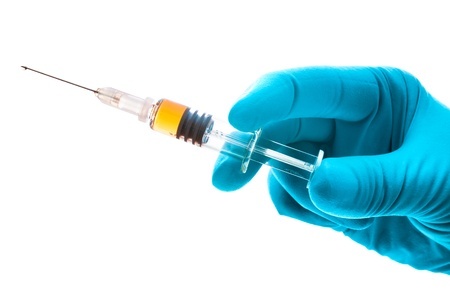Aveed

Aveed, a testosterone injection marketed by Endo Pharmaceuticals, was approved for sale in the U.S. amid controversy. Recent studies indicate that Aveed and other testosterone treatments may increase the risk that a man will suffer a serious heart attack, stroke or blood clot. Aveed has also been tied to anaphylaxis, as well as pulmonary oil microembolism (POME), a dangerous condition that causes blockage of the pulmonary blood vessels.
Aveed Lawsuit Reviews
The nationwide law firm of Bernstein Liebhard LLP is now evaluating product liability claims on behalf of men who experienced heart attacks, strokes, pulmonary embolism or deep vein thrombosis while using prescription low-T therapies. To learn more about filing an Aveed lawsuit, please call (888) 994-5118.
What is Aveed?
Aveed is an intramuscular injection of testosterone and castor oil. The drug is indicated for testosterone replacement therapy in adult males for conditions associated with a deficiency or absence of endogenous testosterone, including:
- Primary hypogonadism
- Hypogonadotropic hypogonadism
Like other prescription testosterone products, the safety and efficacy of Aveed in men with “age-related hypogonadism” have not been established. The prescribing information for Aveed also cautions that the medication should only be used in patients who require testosterone replacement therapy and in whom the benefits of the product outweigh the serious risks of pulmonary oil microembolism and anaphylaxis
Aveed Controversy
The U.S. Food & Drug Administration (FDA) approved Aveed in March 2014. Before it was cleared for sale in the U.S., the FDA had actually rejected approval of the drug on three occasions. In February 2014, Public Citizen filed a petition with the FDA asking that it add a black box warning about the increased risks of heart attacks and other cardiovascular dangers to the product labels of all testosterone-containing drugs available in the U.S. The consumer advocacy group also asked the FDA to once more delay approving Aveed, asserting that “its approval, absent the new black box warning, would cause further cardiovascular damage to new users.”
In approving Aveed, the FDA required that its label include a black box warning regarding the risks of pulmonary-oil microembolism and anaphylaxis. The agency also stipulated that Aveed would be available only through a restricted distribution program known as a risk evaluation and mitigation strategy (REMS) to ensure that it is used only in men for whom the benefits outweigh the risks.
Testosterone Heart Risks
In recent years, a number of studies and warnings have highlighted the cardiovascular risks potentially associated with low-T treatments:
- November 2013: A scientific paper published in JAMA suggests that use of prescription testosterone treatments is associated with a 25.7% risk of cardiovascular side effects, compared to 19.9% for men who were not on the drugs.
- January 2014: A study published in PLoS One found that men over 65 were twice as likely to have a heart attack if they used low-T treatments, while men under 65 with pre-existing heart disease were three times as likely to have a heart attack if they used the drugs.
- January 2014: The FDA announced it was reviewing the safety of low-T therapies amid concerns that the drugs might increase the risk of heart attacks and strokes in certain men.
- June 2014: The FDA orders new blood clot warnings for Aveed and other prescription testosterone treatments, including pulmonary embolism and deep vein thrombosis. Read More
- March 2015: The FDA completes the review announced in January 2015, and orders low-T manufacturers to add new warnings to their product labels regarding a possible association with heart attacks and strokes. Read More
Legal Help for Those Harmed by Aveed
If you or a man you care about suffered a heart attack, stroke or dangerous blood clot while using Aveed, now is the time to ensure your legal rights are protected. To learn more about the growing testosterone litigation, please call (888) 994-5118.
- MedScape (2014) FDA Approves Aveed Testosterone Jab, with Restrictions http://www.medscape.com/viewarticle/821632
- Public Citizen (2014) “Public Citizen Petitions FDA for a Black Box Warning on Testosterone Products” http://www.citizen.org/pressroom/pressroomredirect.cfm?ID=4092
- FDA (2014) “Aveed – Risk Evaluation and Mitigation Strategy” http://www.fda.gov/downloads/Drugs/DrugSafety/PostmarketDrugSafetyInformationforPatientsandProviders/UCM389149.pdf
- JAMA (2013) “Association of Testosterone Therapy With Mortality, Myocardial Infarction, and Stroke in Men With Low Testosterone Levels” http://jama.jamanetwork.com/article.aspx?articleid=1764051
- PLoS One (2014) “Increased Risk of Non-Fatal Myocardial Infarction Following Testosterone Therapy Prescription in Men” http://journals.plos.org/plosone/article?id=10.1371/journal.pone.0085805
- FDA (2014) “FDA Drug Safety Communication: FDA evaluating risk of stroke, heart attack and death with FDA-approved testosterone products” http://www.fda.gov/Drugs/DrugSafety/ucm383904.htm
- FDA (2014) “FDA adding general warning to testosterone products about potential for venous blood clots” http://www.fda.gov/Drugs/DrugSafety/ucm401746.htm
- FDA (2015) “FDA Drug Safety Communication: FDA cautions about using testosterone products for low testosterone due to aging; requires labeling change to inform of possible increased risk of heart attack and stroke with use” http://www.fda.gov/Drugs/DrugSafety/ucm436259.htm
Get the latest news and litigation updates about this case by following us on Facebook. Click the "Like" button below.
Follow Us


